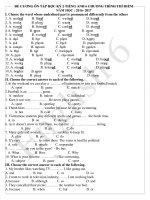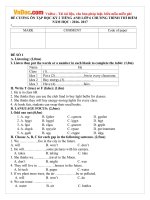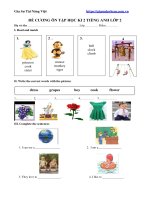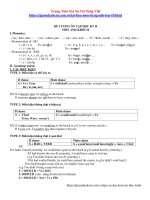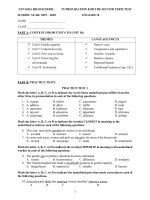Đề Cương Ôn Thi Học Kì 2 Tiếng Anh Lớp 11
Bạn đang xem bản rút gọn của tài liệu. Xem và tải ngay bản đầy đủ của tài liệu tại đây (387.48 KB, 9 trang )
<span class='text_page_counter'>(1)</span><div class='page_container' data-page=1>
<b> NỘI DUNG ÔN TẬP HỌC KỲ 2 </b>
<b> MÔN: TIẾNG ANH KHI 11 </b>
<b>A. Lý thuyết cơ bản </b>
<b>I. Pronunciation: /sp/- /st/- /sk/- /sl/- /sm/- /sn/- /sw/- /∫r/- /spl/- /spr/- /str/- /skr/- /skw/ </b>
/pt/- /bd/- /bz/- /ps/- /nt/- /nd/- /nθ/- /ns/-/nz/
<b>II. Grammar: </b>
1. Cỏch sử dụng đại từ quan hệ (who, whom, which, that, whose) và trạng từ quan hệ (where, when, why)
2. Mệnh đề quan hệ xác định và mệnh đề quan hệ không xác định
3 Vị trí của giới từ trong mệnh đề quan hệ
4. Dạng rút gọn của mệnh đề quan hệ: V-ing/ Ved
3 / to V
5. . Cleft sentences: Câu nhấn mạnh
Câu nhấn mạnh chủ ngữ (subject focus): It is/ was + S + that/ who + V…:
Câu nhấn mạnh tân ngữ (Object focus): It is/ was + O + That/ Who + S + V
Câu nhấn mạnh trạng từ (Adverbial focus): It is/ was + Adv + that + S + V
Câu nhấn mạnh bị động: It is/ was + O + that + is/ are/ was/ were + Vpp
6. Tag question: câu hỏi đuôi
<b>7. Could/ be able to. </b>
8. Passive voice with THAT Clause: Câu bị động với mệnh đề "that" (Ôn qua)
S1 + V1 + that + S2 + V2 → It + be + V1pp + that + S2 + V2
→ S2 + be + V1pp + to V2
Chú ý: - Be chia theo thì của V1
- V1 thường là: believe, consider, feel, know, think, say, understand, find, expect…
9. Vocabulary: tõ vùng tõ bµi 9-16
<b>B. EXERCISES: </b>
<b>I. Phonetics: Circle the word whose underlined part is pronounced differently from that of the other </b>
<b>words. </b>
1. A. facsimile B. transfer C. spacious D. fax
2. A. equipped B. delivered C. transferred D. received
3. A. helps B. provides C. documents D. texts
4. A. decided B. stopped C. washed D. laughed
5. A. summers B. exams C. countries D. houses
6. A. supply B. dirty C. energy D. happy
7. A. decreased B. influenced C. endangered D. established
8. A. answer B. sweater C. swim D. switch
9. A.hopes B. takes C. tastes D. arrives
10. A. worked B. forced C. caused D. matched
11. A. equip B. service C. limit D. beside
12. A. spacious B. parcel C. part D. spa
13. A. sell B. smile C. enthusiasm D. small
14. A. swing B. sweet C. answer D. swan
15. A. research B. reserve C. present D. because
16. A. test B. solidarity C. event D. question
17. A. introduced B. added C. participated D. appreciated
18. A. collected B. talked C. cooked D. jumped
19. A. trends B. decisions C. markets D. offers
20. A. lets B. pursuits C. sleep D. waterfalls
21.A. studied B. raised C. seemed D. stopped
</div>
<span class='text_page_counter'>(2)</span><div class='page_container' data-page=2>
23A.depth B. smooth C. threat D. teeth
24A.wrinkle B. wreck C. wind D. sewage
25A.university B. unit C. unique D. undo
26A.main B. certain C. complain D. explain
27A.please B. advice C. allowance D. base
28. A. exist B. decline C. recognize D. enrich
29. A. athlete B. advance C. advantage D. adventure
<i>30. A. polite </i> <i>B. define </i> <i>C. describe </i> D. promise
<b>II. VOCABULARY & GRAMMAR: Choose the best answer </b>
1. The hotel staff are friendly and_______
A. unhelpful B. courteous C. discourteous D. impolite
2. A person who receives something is called________
A. receive B. receipt C. recipe D. recipient
3. Fax transmission has now become a cheap and ____ way to transmit texts and graphics over distance.
A. inconvenient B. convenient C. uncomfortable D. comfortable
4. If you ____ to your favorite newspapers and magazines, they will be delivered to your house early in the
morning.
A. buy B. book C. pay D. subscribe
5. The post office offers the_______ Mail Service which is particularly fast
A. Secure B. Efficient C. Express D. Reliable
6. We are proud of our ________ staff, who are always friendly and efficient.
A. well-done B. well-appointed C. well-behaved D. well-trained
7. People can buy daily ____ in many local post office in early morning.
A. newspapers B. books C. postcards D. letters
8. People are destroying the environment by adding ____ to it.
A. pollutes B. pollutions C. pollutives D. pollutants
9. The Earth will be a planet where human beings, animals and plants live in peaceful _____.
A. cooperation B. coordination C. corporation D. coexistence
10. Dinosaurs became ____ millions of years go.
A. disappear B. extinct C. lost D. endangered
11. The war brought death and ______ to the city.
A. destruction B.. destruct C. destroyed D. destroy
12. Are there any ______ rivers left in the world?
A. pollutions B. unpolluted C. pollutant D. polluted
13. The waste from the chemical factory is extremely ______.
A. harm B. harmful C. unharmed D. harmless
14. Coal and oil are __________source of energy.
A. renewable B. non-renewable C. unlimited D. plentiful
15. However, such reserves are strictly limited
A. slightly B. slowly C. severely D. easily
16. Because power demand is increasing very rapidly, fossil fuels will be exhausted within a short time.
A. enabled B. tired C. bushed D. emptied
17. We should develop such ____ sources of energy as solar energy and nuclear energy.
A. tradition B. alternative C. revolutionary D. surprising
18. Increased consumption will lead to faster ____ of our natural resources.
A. exhaust B. exhausting C. exhaustion D. exhaustive
19. People have used coal and oil to ____ electricity for along time.
A. generation B. generated C. generate D. generates
20. Besides watching television, people have other ………. .
A. pursuits B. hobbies C. interests D. All are correct.
</div>
<span class='text_page_counter'>(3)</span><div class='page_container' data-page=3>
22. Yuri Gagarin became the first person to eat and drink in the ………..
A. weightless B. weight C. weigh D. weightlessness
23. Before Gagarin’s historic flight, there were still enormous………
A. accidents B. uncertainties C. certainties D. successes
24. I think you ……… better not tell him the truth.
A. had B. would C. should D. will
25. Do you know when the 2006 Asian games took place?
A. happened B. deepened C. added D. struggled
26. Korea was chosen to be the……….of the 2002 Asian Games.
A. athlete B. host C. participant D. guest
27. After the accident he lost his………..…….for the sport.
A. enthusiasm B. enthusiast C. enthusiastic D. enthusiastically
28. On some special occasions, people often march and demonstrate to show their……..
A. nation B. event C. culture D. solidarity
29. All the international games have been developed in all……...., from the qualitty of the atheletes to the
sports equipment.
A. kinds B. sorts C. types D. aspects
30. He rang James, …..a good friend as well as his trainer.
A. who was B. that was C. being D. to be
31. …..came from France were really more friendly than any others.
A. The athletes, that B. The athletes whom
c. The athletes who D. The athletes which
32. That is Mr Pike, a referee, …..I told you about.
A. that B. which C. whom D. whose
33.The athlete……could not compete because of his injury.
A. about I told you B. about whom I told you
C. whom I told you D. I told you
34. The official, …..the drug was found, has been arrested.
A. in whose car B. in which car C. car in which D. in that car
35. The boys are talking about the exciting match……on TV.
A. seeing B. they saw C. whom they saw D. to see
36. Thousands of people……along the road watched the bicycle racing.
A. stand B. that stand C. standing D. stood
37. The death of his son was an experience from……he never fully recovered.
A. when B. why C. that D. which
38. The gymnasium has just equipped with some new sports……….
A. facilities B. events C. athletes D. medals
39. It is said that there will be some more new sports added…the Games
A. in B. for C. with D. to
40. Do you know the girl ……… a long white dress?
A. wears B. to wear C. wear D. wearing
41. The house ………… 40 years ago is still in good condition.
A. which built B. to build C. built D. building
42. I like the food ……….by my mother.
A. was cooked B. cooked C. which cooked D. cooking
43. The man ……….. at the back board is our teacher.
A. stood B. stands C. standing D. to stand
44. Armstrong was the first astronaut ………….. onto the moon
A. to step B. stepping C. stepped D. steps
45. The bank manager was the second person ………….. by the robbers
A. to be killed B. who killed C. killing D. kills
46. The subject ,…………..we are going to discuss , is very important.
</div>
<span class='text_page_counter'>(4)</span><div class='page_container' data-page=4>
A. then B. it C. him D. your
48. When I was six, I…………..ride a bike.
A. can B. could C. was able to D. was
49. The player hurt in his leg, but he …………..play to the end.
A. can’t B. could C. couldn’t D. was able to
50. He’ll go to college,………...he?
A. will B. won’t C. doesn’t D. does
<b>Choose the antonym (từ phản nghĩa) of the underlined word: </b>
<b>51. There are number of things I like to do in my free time. </b>
A. pleasure B. precious C. busy D. idle
52. My uncle, who is an accomplished guitarist, taught me how to play.
A. unimpaired B. unskilled C. ill-educated D. unqualified
53. Now I can play a few simple tune.
A. compound B. plain C. easy D. complicated
54. He advised me to practise playing the guitar regularly.
A. unusually B. commonly C. freely D. completely
55. I have a modest little glass fish tank where I keep a variety of small fish.
A. limited B. excessive C. conceited D. moderate
56. I always remove the stamps before discarding the envelopes.
A. dispending B. disposing C. dumping D. keeping
<b>Choose the synonym (từ đồng nghĩa) of the underlined word: </b>
57. However, form of popular entertainment are different in different countries.
A. same B.unlike C. unusual <b>D. various </b>
58. In Britain, the most common leisure activities are home-based
A. regular B. popular C. familiar D. uncommon
<b>MISTAKES * Choose the underlined part among A, B, C or D that needs correcting. </b>
59. Your grandfather could speak five languages, could he?
A B C D
60. She spoke very soft , but I can hear what she said.
A B C D
61. I used to be to stand on my head but I can’t be able to do it now.
A B C D
62.The trip was cancelled last week. John couldn’t go away because he was ill.
A B C D
63. On 15th October in 2003, China launched its first manned spacecraft into space, wasn’t it?
A B C D
64. It was at the shop which she bought a wonderful present for him on his birthday.
A B C D
65. This school is only for children their first language is not English.
A B C D
66.John was the last man reached the top of the mountain in the contest held last year.
A B C D
<b>67.Using bicycles in big cities is good because they are not only clean and easy to park. </b>
A B C D
68.The song to that we listened last night was beautiful.
A B C D
69. Do you get on with the person whom lives next door?
A B C D
</div>
<span class='text_page_counter'>(5)</span><div class='page_container' data-page=5>
<b>III. Combine these pairs of sentences, using WHERE, WHICH, WHO, WHOM, WHOSE, THAT </b>
1. The girl is sitting by Jack. She is Mary.
2. Can you understand the question? He asked you the question last time.
3. Is that the girl? We saw her on T.V last night.
4. The farm produces milk. We visited it last Sunday.
5. At last he married the girl. He loved her.
6. The man is an engineer. We play with his daughter everyday.
7. He didn’t receive the letter. I sent him the letter last January.
8. He often tells me something about his village. He was born there.
9. The children like the funny stories. Their grandmother tells them those stories every evening.
10. Jack London is a famous American writer. He wrote “Iron heel”.
11. Our teacher assigned us the homework. We had to finish it within a week.
12. Ngoc has just moved to a new school. It was built two years ago.
13. The man is selling lottery tickets. He used to be very rich.
14. Hai’s friend is a very interesting boy. He came from Da Nang.
15. Mekong Delta is located in the South of Viet Nam. It provides most of the rice for exporting.
<i><b>IV. Replace relative clauses by participles and to infinitives </b></i>
1. Neil Armstrong was the first man who walked on the moon
2. I come from a city that is located in the southern part of the country.
3. The children who attend that school receive a good education.
4. The scientists who are researching the causes of cancer are making progress .
5. They live in a house that was built in 1980 .
6. We have an apartment which overlooks the park .
7. Yuri Gagarin became the first man who flied into space .
8. We stood on the bridge which connects the two halves of the building .
9. I come from a city which is located in the southern part of the country.
10. The vegetables which are sold in this supermarket are grown without chemicals
</div>
<span class='text_page_counter'>(6)</span><div class='page_container' data-page=6>
12. Thomas was the first man that reached the top of the mountain.
13. The first student that hands in the paper will get a small gift.
14. She was the fourth woman who finished the race.
15. I really don’t know the first man that traveled around the world.
<b>16. The man who is living next door invites us to his wedding anniversary. </b>
17. The book which is written by Robert gets lots of attention.
18. Can Tho, which is known as a province with fertile soil conditions, is located in the middle of the Mekong
River delta.
19. The victims who were injured in the accident were taken to the hospital.
20. The message which is sent today may reach them tomorrow
<b>V. Rewrite the following sentences, using cleft sentences. (It is/was……….that…….) </b>
1. The English pronunciation causes a lot of trouble.
2. Animal circus makes our children most excited.
3. Swimming in a swimming pool on a hot day makes us feel healthier.
4. My husband always helps me do the housework.
5. My daughter writes this work book with me.
6. I want to see my English teacher.
7. She met her husband 25 years ago.
8. He brought the house for his daughter.
9. My son h learned some of irregular verbs by heart.
10. Ha advised Lan to go out for relax after studying hard.
11. The book was bought yesterday is very interesting.
12. I’d love to see different kinds of painting at the Trang Tien exhibition.
13. The train leaves for Ho Chi Minh city at 8:00 a.m everyday.
14. I met my old teacher at the bus stop by accident.
15. My daughter was born in 1980.
<b>V I. Add the tags to complete the sentences. </b>
</div>
<span class='text_page_counter'>(7)</span><div class='page_container' data-page=7>
4. You’re Rachel’s friend, ………? – Yes , I’m Vicky.
5. You came in a sports car, ………..…..? – That’s right.
6. We can sit on the grass,………....?- I think it’s dry enough.
7. The weather forecast wasn’t very good,……….? – No , it wasn’t.
8. Nothing can happen, ……….?
9. You always learn hard,………..….?
10. Dinosaurs became extinct millions of years,………?
11. Visitors do not help to preserve and protect national parks, ………..?
12. No one has been there,………..?
13. Bill came on a bicycle,………..………?
14. The Smiths have two cars,………..?
15. It could be done,……….?
16. She’s got lovely blue eyes,……….?
17. That’s him over there,……….? He hardly ever makes a mistake, 18.
Let's go out for dinner tonight, ………..?
19. That isn't Bill driving, ………...?
20. I'm too late, ……….. ?
<b>VII. Put the verb in the correct tense. </b>
1. They (practice) their music lesson at 7 o'clock tomorrow.
2. I wouldn't have eaten it if I (know) that there was ginger in it.
3. Be quiet! The teacher (explain) the lesson.
4. Ice (turn) to water if you heat it.
5. If I (try) again I think that I would have succeeded.
6. There (be) many tall and big trees in front of my house in 1998.
7. They went home after they (finish) their work.
8. The bell rang while Tom (take) a bath.
9. I could get a job easily if I (have) a degree.
10. We (not see) her since we (be) on holiday in Ha Long bay.
11. Phuong (not finish) her homework yet.
12. When I was young, I (want) to be a bus driver.
13. Last night when we (visit) him, he (do) an experiment on the upstairs.
14. As soon as I (have) enough money, I'll buy a new car.
15. The phone (ring) at midnight last night after she (go) to sleep.
<b>VIII. Read the passage and answer the questions </b>
<i><b> Reading1: Many people still believe that natural resources will never be used up. Actually, the world’s </b></i>
energy resources are limited. Nobody knows exactly how much fuel left. However, we also should use them
economically and try to find out alternative sources of power. According to Professor Marvin Burnham of the
New England Institute of Technology , we have to start conserving coal, oil and gas before it is too late ; and
nuclear power is the only alternative.
However, many people do not approve of using nuclear power because it is very dangerous . What
would happen if there were a serious nuclear accident? Radioactivity causes cancer and may badly affect the
future generations. The most effective thing is that we should use natural resources as economical as possible.
1. How much fuel is left?
………..
2. How should we use coal, oil, and gas?.
………
3. According to Professor Marvin Burnham, what do we have to do before it is too late?
………..
4. Is using nuclear power unsafe?
</div>
<span class='text_page_counter'>(8)</span><div class='page_container' data-page=8>
………..
<i><b>Reading2: I’m interested in sports, especially athletics, and I run seven or eight kilometers every day. I </b></i>
particularly enjoy cross country running, where you have to run across fields, jump over streams and so on.
While I’m running I think about all sorts of things, and at the end of a run I’m sometimes surprised to find that
I’ve managed to solve a problem that was on my mind.
Next year, I’m going to try the London Marathon. It’s hard race 26 miles, or 42 kilometers-and you have
to be tough to finish, but I very much want to do it. I worry a bit about getting too old, and I’d like to prove to
myself that I’m still almost as fit as I was twenty years old.
I’m interested in mountaineering as well as running. I’ll never become an except climber, but I know
what I’m doing in the mountains. I successfully completed a course in snow and ice climbing when I was
younger; and I’ve done a series of easy climbs in the Alps during the last few years. My wife doesn’t share my
interest in mountains. She agreed to go climbing with me once, but she found that she felt ill as soon as she got
above 1,000 meters.
1. Is the writer interested in athletics?
……….
2. At the end of a run, what does the writer sometimes find?
………
3. Why does the writer want to take part in the London Marathon?
………
4. Where and when has the writer done a series of easy climbs?
………..
5. Why isn’t the writer’s wife interested in mountaineering?
………..
<i><b>Reading3: I like to be near water – sea, lake or river. That I probably because I was born in a village by </b></i>
<i><b>the sea, and I have lived most of my life close to water. When I am in some place which is far from lake, river </b></i>
and sea, I am restless and I always feel that there is something missing, even though it is sometimes hard for
<b>me to decide what it is. </b>
Of course, the sports I like are the ones which need water – sailing, rowing and swimming. It is possible
to swim in small swimming pools, but rowing and sailing are impossible without a lot of water. Rowing is
best in a river and sailing on the sea or a big lake, but one can do some sailing on a river and one can certainly
row on a lake or the sea when the weather is good.
Of the three sports – swimming, rowing and sailing – I like rowing best because it is the easiest to
continue during the winter, when the water is too cold for comfortable swimming and the sea is often too
rough for sailing. Even on the coldest day one row, only ice on the water or thick fog can stop one. Sometimes
it is so cold when I go out rowing that drop of water freeze wherever they fall. In such weather, it is not very
pleasant to swim as one cannot stay in the water very long. However, when is rowing, one gets warmer the
longer one goes on.
1. Where was the writer born?
………..
2. How does the writer feel when he is in some place which is nor near the water?
………..
3. What type of sport does he like?
………
4. Why does he like rowing best?
……….
5. What does the word “which” in paragraph 1 refer to?
</div>
<span class='text_page_counter'>(9)</span><div class='page_container' data-page=9></div>
<!--links-->
